Audio Version Of The Blog – 10/7/20
Listen to an Audio Version of the Blog
Download:MP3 Audio

Listen to an Audio Version of the Blog
Download:MP3 Audio

Moses isn’t a person, but a desire that is completely devoted to the Creator. Moses is a trusted guide, showing the example, caring for us, and drawing the quality of bestowal above so that by revealing this quality inside of us, we will build the Creator’s form inside of us. The quality of Moses brings us to equivalence with the Creator, adhesion with Him.
When the force of bestowal and the force of reception combine in the right form and increase each other in the middle line, the middle line occurs in a person not as a simple sum of right and left lines, but as a demonstration by each of its oppositeness and its greatness.
Man, Adam, means “similar” (Domeh) to the Creator. Jacob is the most important of the three forefathers—these are qualities that are revealed in a person to the extent of his equivalence to the Creator. The quality of Jacob is called Tifferet – splendor, beauty, honor, the Creator’s qualities that are revealed inside of creation.
Jacob is the most important spiritual quality. Abraham symbolizes bestowal from the Creator, Isaac – revelation of the will to enjoy in creation. Jacob is the unity of the two qualities, bestowal and reception, the right and left line, through man’s inner work to connect the two lines by which he becomes like the Creator.
From Twitter, 10/7/20
Related Material:
My Thoughts On Twitter 10/6/20
My Thoughts On Twitter 10/3/20
My Thoughts On Twitter 9/29/20

The Times of Israel published my new article “Let’s Talk about Tik Tok Antisemitism against Our Youth”
Online antisemitism is nothing new but now it seems to be widely targeting our vulnerable youth more than ever before. Hidden under false identities, haters freely reveal prejudice, bigotry, and antisemitic views across virtually all the unruled space of social media.
Teenagers who identify as Jewish complain of constant hostility on platforms such as Tik Tok, which are increasingly popular among youth. What would be the best way for them to react and deal with this? First of all, understanding what lies behind such hatred will empower them to turn the hostility into acceptance and embrace.
Since the beginning of 2020, more than a staggering 380,000 videos and over 64,000 hateful comments have been removed in the US alone for violating hate speech policies, according to Tik Tok officials. But the reality shows that although some efforts are being aimed at controlling online hostility, this poison rapidly renews itself and spreads worldwide like a virus.
Young American Jews say that in the past when they uploaded content to the platform without disclosing their background they received rave comments, but as soon as they revealed the fact that they are Jewish, the compliments turned into insults and antisemitic outbursts. The comments they continue to receive include praises for Hitler, Nazi salutes, anti-Israel jabs, and Holocaust denial. Tik Tok also recently faced controversy over history trivialization due to a “Holocaust challenge” that appeared on the app in which users flippantly portrayed themselves as concentration camp victims.
Such controversies and antisemitic manifestations are eye-openers to people’s true nature and sentiments toward Jews. Therefore, it is important they are revealed. It is as futile to bury our heads in the sand about this as it is trying to escape Judaism, leaving our youth rootless and without a sense of belonging anywhere. The disclosure of hatred can be a positive thing if it awakens in young Jews the vital question of why the Jew-hatred exists. Only an understanding of the foundation of this phenomena and an awareness of what the world expects from Jews can provide young Jews with the basis for solving the problem of antisemitism.
How to React?
Jew-hatred is irrational, so a war of words or altercations are worthless. Antisemitism by character requires no justification, although one will always be found. Many believe the hatred stems from envy: Jews are smart, successful, and innovative; they control the media, the entertainment industry, banks, and commerce. But these are no more than superficial rationalizations that both we and our haters use in order to justify the animosity. The root of the animosity is much deeper than that.
Humanity instinctively feels that the Jewish people hold the key to a better world. Why the Jews? And why the increasing pressure now? The Hebrew word for “Jew” [Yehudi] comes from the word for “united” [yihud]. Unity is the very essence of our people which was established according to the tenet, “love your friend as yourself” in order to become “a light unto the nations.” As the world endures escalating divisions and conflicts, there is a subconscious expectation that Jews should unite and be like a conduit to funnel this positive unifying force from nature to the whole world.
The problem is that we have completely lost awareness of the importance of our Jewish unity, and instead, frictions and separation prevail. And the more that people of the world feel problems and crises stemming from the divisiveness in human society, the more they will subconsciously feel that Jews are to blame.
Antisemitism thus surfaces as a natural phenomenon among the nations of the world in order to pressure Jewish people to unite. In other words, by becoming a good example to the world of positive connection, harmony, and support, the general attitude toward a unified Jewish people will become favorable and encouraging, and confidence within society at large will rise. Now that we realize that we hold the key to a good future for our own youth and the entire world, it is time for us to walk the talk.
[272018]
Medium published my new article “Former Chief Doctor’s Dismal Prediction Is Reversible”
Sally Davies, former chief medical officer for England, wrote on The Guardian that “Covid-19 is neither the first nor the last health emergency we will face. My fellow scientists estimate that we will face a pandemic or health emergency at least once every five years from here on. There is a chance that this is the optimistic scenario. The reality could be far worse.” I think their prediction is both good news and bad news. It is good news because scientists are beginning to realize that the pandemic isn’t a one-time event, but part of a permanent process of change. At the same time, it is bad news because scientists have no clue as to what to do about it. They offer dubious solutions to mitigate the destruction these crises will inflict on humanity, but they have no idea how to prevent them, how to reverse the dismal trajectory, and they don’t even think in that direction. Are we then doomed to suffer from here on? No, we’re not. By strengthening our solidarity, we can reverse the trajectory and prevent such crises from happening altogether.
How we relate to one another, how we build our social networks, what we project to others, and what values we install in society all have a real impact on our health. Well connected people are not only much happier; they are also much healthier.
In 2015, Julianne Holt-Lunstad, renowned neuroscientist and psychologist at Brigham Young University, published an extensive analysis that looked into the influence of social isolation, loneliness, and living alone on people’s health. The results were notable in light of today’s pandemic. She found that social isolation “led to an increased rate of mortality of twenty-nine per cent, and living alone by thirty-two per cent — no matter the subject’s age, gender, location, or culture,” The New Yorker published on March 23, 2020.
In a recent interview for the Israeli newspaper Haaretz, Holt-Lunstad said that being socially active “not only prolongs our life expectancy, but also influences our health in other ways, such as resistance to viruses” (translated from Hebrew). In the interview, Holt-Lunstad also referred to a Carnegie Mellon University study that found that people with many solid social ties have a better immune system and better resistance to viruses of the common cold, while people with few social ties were significantly more vulnerable. The researcher stressed that while we should not disobey authorities’ instructions regarding social distancing and wearing masks, we should make a conscious effort to maintain social ties under these limitations.
These conclusions coincide with what I have been saying since the beginning of the outbreak, but there are more conclusions to be drawn from these findings. I think we shouldn’t take a passive approach here but rather be much more proactive. Viruses, including the coronavirus, have been around long before the Covid-19 outbreak. We could have been infected long ago but we weren’t because our immune system was stronger.
Especially over the last several decades, we have been growing increasingly isolated, and therefore weaker. This isolation is part of what researchers Jean Marie Twenge and William Keith Campbell call “a narcissism epidemic.” In their aptly titled book The Narcissism Epidemic: Living in the Age of Entitlement, they establish that over the past few decades, we have seen an exponential growth in narcissistic tendencies among young people and the general population. In simple words, we are growing far more egoistic than before, far more quickly than before, and therefore far more lonely. By doing so, we are weakening our immune system and exposing ourselves to health threats that didn’t use to pose any risk before. This is why I keep saying that we will not find a vaccine or a cure for the coronavirus since even if we find something for this plague, another, even worse menace will quickly replace it. Now, finally, medicine corroborates.
If we want to protect ourselves from viruses and other forms of natural crises, we have to work on our social cohesion, on our relations with each other, on our solidarity as a society, and in our communities. This is not a theoretical assumption; it is a practical measure we must take in order to protect ourselves and our loved ones from getting sick and dying or remaining maimed.
How we relate to one another, how we build our social networks, what we project to others, and what values we install in society all have a real impact on our health. Well connected people are not only much happier; they are also much healthier.
Next time we want to trash someone on social media or even to our friends, we should think twice before doing so; it will backfire on us. And after we stop trashing, let’s start building a positive society, one that values caring and helping out. Let’s not be selfish; it simply doesn’t pay.
 Michael Laitman, On Quora: “What is the most important factor in raising children to be honorable decent human beings?“
Michael Laitman, On Quora: “What is the most important factor in raising children to be honorable decent human beings?“
The most important factor in raising children is to prioritize their positive connection with each other, which comes from their absorbing positive examples from adults.
Since children learn from their elders, then if we succeed in improving our relations, and by doing so, embody a living example of well-oiled connections that bring about harmonious outcomes—happiness, confidence, security, love and care—then the children will follow suit, and naturally build positive relations to each other and to nature.
Positive social connections are key to realizing our full potential as human beings. If we truly care about our children growing up to be healthy, happy, confident and safe adults, then we need to be concerned that we ourselves upgrade our relationships, since that is most important factor to both our own and our children’s better lives.
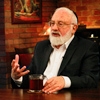 Remark: Jonathan Swift wrote in Thoughts on Various Subjects: “All fits of pleasure are balanced by an equal degree of pain and languor; it’s like spending this year part of next year’s revenue.”
Remark: Jonathan Swift wrote in Thoughts on Various Subjects: “All fits of pleasure are balanced by an equal degree of pain and languor; it’s like spending this year part of next year’s revenue.”
My Comment: From Kabbalah’s point of view, this is not entirely true. Because if a person is born not of his own freewill, unable to choose the family he is born into, and receives an excellent upbringing, without denying himself anything, since such is his family and so on, then you cannot ask anything from him. So, he was made according to the higher design.
Question: Does he have no freedom?
Answer: Of course not. So, he should not be responsible for this. But when he has a clear, definite opportunity to start remaking himself, then he will be held responsible for it. But also, only to the extent that he was actually given this opportunity.
All people who exist in our world, from rich to poor, from healthy to sick, whatever they want, the way
they exist, this is how they exist. There can be no complaints about them.
Question: But don’t we still make claims? How do we judge people?
Answer: So you judge by your courts. You invented the courts and you judge. How can you judge people? For what?! For what is in me from the Creator who created me this way, and from my parents whom the Creator created so that they would have such an effect on me?
So, who am I? Where do I have my point, the point, of freedom, which I can use and grow myself from? How do I know the right way to do it? Why would I?
What does a person have that is not given to him by nature? How can he then change himself? If I need to change myself, then I must have a lever.
What kind of freewill does a person have? What is it? There is no freewill. You cannot point to some free movement of his, a free desire, a free thought, that he did not receive from someone or something, but so that would appear from nowhere. There is no such thing! Therefore, man is not free.
Question: So, was I created by nature and nature leads me from the beginning to the grave?
Answer: Absolutely in everything! On top of that, there is an illusion of freedom!
Question: Here nature is playing with me. What gives me the illusion of freedom?
Answer: It is done specially to make you feel like a human!
Freedom appears only when another force arises in a person, a higher force, which begins to oppose his earthly power. Only in the difference between them, in the interval between them, can a person gain independence from both forces and obtain his free choice. Only if there is a need for meaning in life.
The meaning of life is comprehended only in the search for independence. It is not about becoming like others, depending on the way they are, some are richer for example. Do not take any example from others! I need—me. My own self.
Question: Which is completely different from that of the rich or the poor?
Answer: It is true even if one is on a desert island. My only goal is to find myself.
Question: Does the search for a person begin with this?
Answer: Yes. From the fact that he understands that he is not free he begins to seek what freedom is. He begins to understand that freedom consists, first of all, in rising above his egoism, which completely fills him, subjugates him. Although a person cannot get rid of this selfishness, he would like to!
When he cannot, but wants to, then he finds an opportunity to attract an outside force to himself, which, even despite his efforts to remain in egoism, will pull him out of it. I do not want to get out of egoism, but I do it so that this higher power pulls me out anyway. There is such an interesting twist! But it is great.
Question: So, do I reach the state that I do not want to get out of egoism?
Answer: Of course, I do not want to. Nobody wants to! On all spiritual levels, nobody wants to do it.
Question: A man has been striving for this for so long, why does he not want to?
Answer: How did he strive? He was not aware of anything. Now, when it is revealed that he is all selfish, he cannot. How can he part with this?
Question: So, is this egoism very dear to him?
Answer: Yes. This is all the agony of leaving Egypt, crossing the Red Sea.
Question: How does this happen?
Answer: This happens because you are doing such completely unreasonable actions, and these actions pull you out. And then: “I do not want, I do not want!”—but it is too late.
[270091]
From KabTV’s “News with Dr. Michael Laitman” 5/18/20
Related Material:
Who Makes A Choice?
What Is A Person Responsible For?
Imaginary And True Freedom, Part 3 – Absolute Freedom
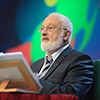 Question: The Torah describes Moses as being tongue-tied. What does this mean? How can a leader be tongue-tied?
Question: The Torah describes Moses as being tongue-tied. What does this mean? How can a leader be tongue-tied?
Answer: Moses could not communicate with people in the language that they understood, because he was several steps above them.
Question: Do you think a leader needs to study public speaking?
Answer: If this is a real leader, then not necessarily. He needs to be understood by those people who own the art of public speaking to carry his ideas to the masses.
I remember once my teacher and I were at a wedding as guests of honor. A man came up to us to consult with Rabash about a small speech at this wedding.
My teacher said one or two phrases, and he exclaimed: “That’s it, this is enough for me for half an hour.” That is, you give a person a small clue, and from it he can already develop his thought further and make big speeches that capture people.
[271495]
From KabTV’s “Management Skills” 6/11/20
Related Material:
Management And Leadership
Leaders Are Born
Informal Leadership
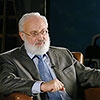 Question: Some psychologists believe that there are conflicting personalities. Do you agree with this?
Question: Some psychologists believe that there are conflicting personalities. Do you agree with this?
Answer: I think that this is, in general, not bad. The higher I rise, the more my views and personal feelings can become extremely opposite to views and personal feelings of others.
Moreover, this gives me more opportunities to correctly evaluate the opinion of another and understand how one can combine with such an absolutely opposite opinion. Indeed, it is based upon opposites that I comprehend the next, higher stage of my development.
In principle, if a goal and its achievement are important to me, then this can cause a conflict. And if the goal is not important, then disagreements will not arise.
For example, the absence of conflict in the family indicates that the spouses are indifferent to each other, they are not interested in the general connection. There is even a proverb: “The falling out of lovers is the renewal of love.” That is, quarrels are a guarantee of future closer contact. This is an important indicator of a relationship.
[271399]
From KabTV’s “Management Skills” 7/16/20
Related Material:
How To Resolve Conflicts In The Family
The Shared Space In Which A Family Is Born
Moment, Stand Still!
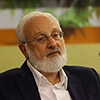 Question: What advice can you give to young people, especially in the post-coronavirus era? Which professions will remain and where to concentrate their efforts?
Question: What advice can you give to young people, especially in the post-coronavirus era? Which professions will remain and where to concentrate their efforts?
Answer: I think that the most important thing in the future will be what the whole society needs. This will be the focus.
Each person should know what society will need in order to secure for himself the right job, the right skills and education. Therefore, there is nothing more important than getting proper upbringing and becoming a person who can educate others.
In other words, social work aimed at consolidating all members of society, at turning society into an integral, correct system is the most important thing. Such people will always be needed. I would advise young people and people of any age to learn exactly this.
This is a profession that everyone needs personally, not even for work but for their and everyone else’s proper participation and integration into society.
[271392]
From KabTV’s “The Post-Coronavirus Era” 6/4/20
Related Material:
Find Yourself
Professions Of The Future
The Most Important Professions
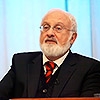 Remark: A leader, in principle, can be informal, for example, in the classroom, in the yard, in a football team.
Remark: A leader, in principle, can be informal, for example, in the classroom, in the yard, in a football team.
My Comment: This happens when a certain group of people, who perceive a particular person as the highest, becomes attached to him and worships him.
Remark: There are many courses on how to become a leader. But it turns out that a person does not have a chance to become a leader because they are made by nature.
My Comment: There are people who seem to become leaders on their own because they really strive for this, but in general, I do not believe that this is possible. If we talk about real leaders, then there must be some kind of higher predestination.
Question: Should a leader be recognized by the majority?
Answer: He must be recognized by a certain mass of people who consider him above all others.
[271345]
From KabTV’s “Management Skills” 6/11/20
Related Material:
Leaders Are Born
From The Heights Of Olympus
Management And Leadership